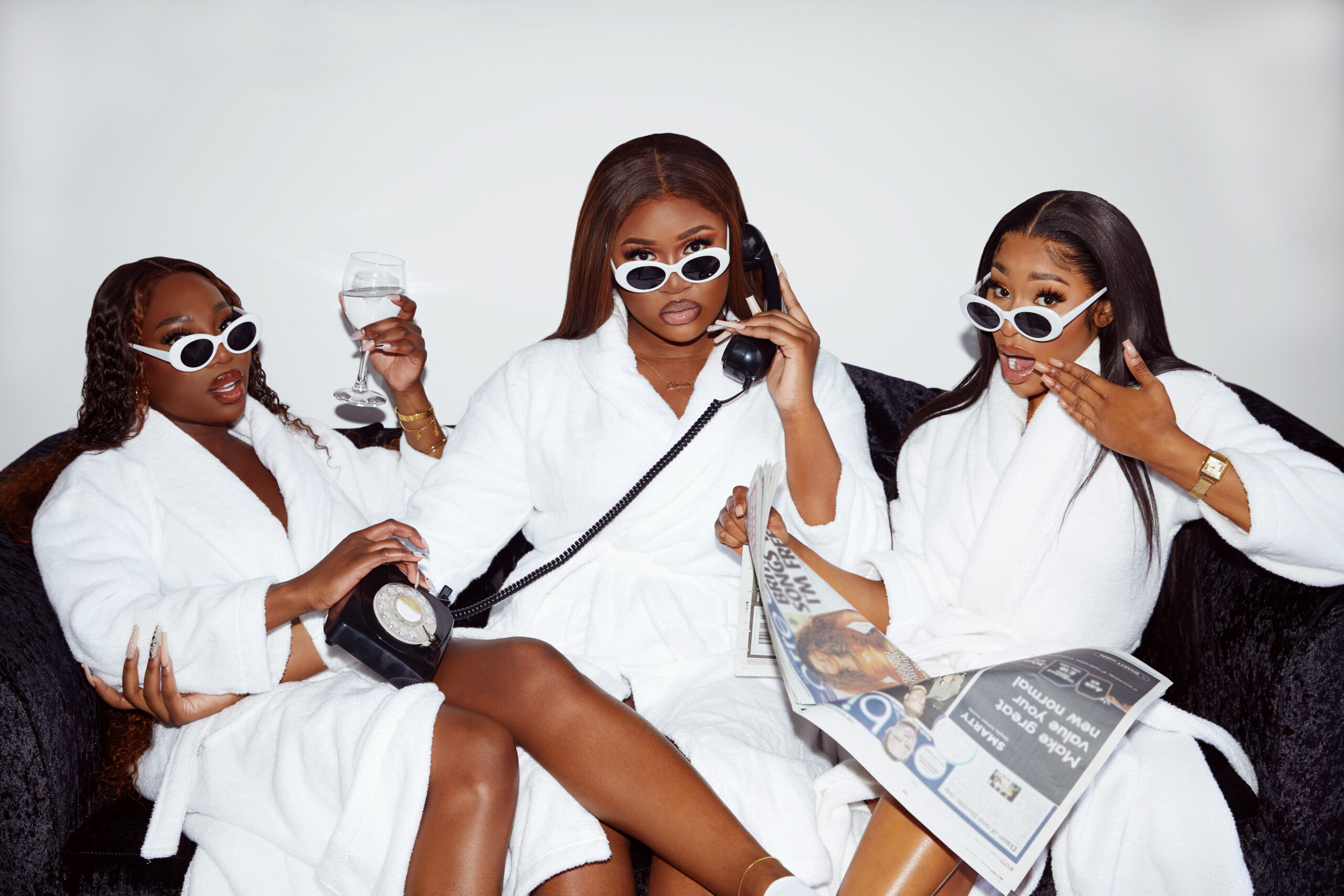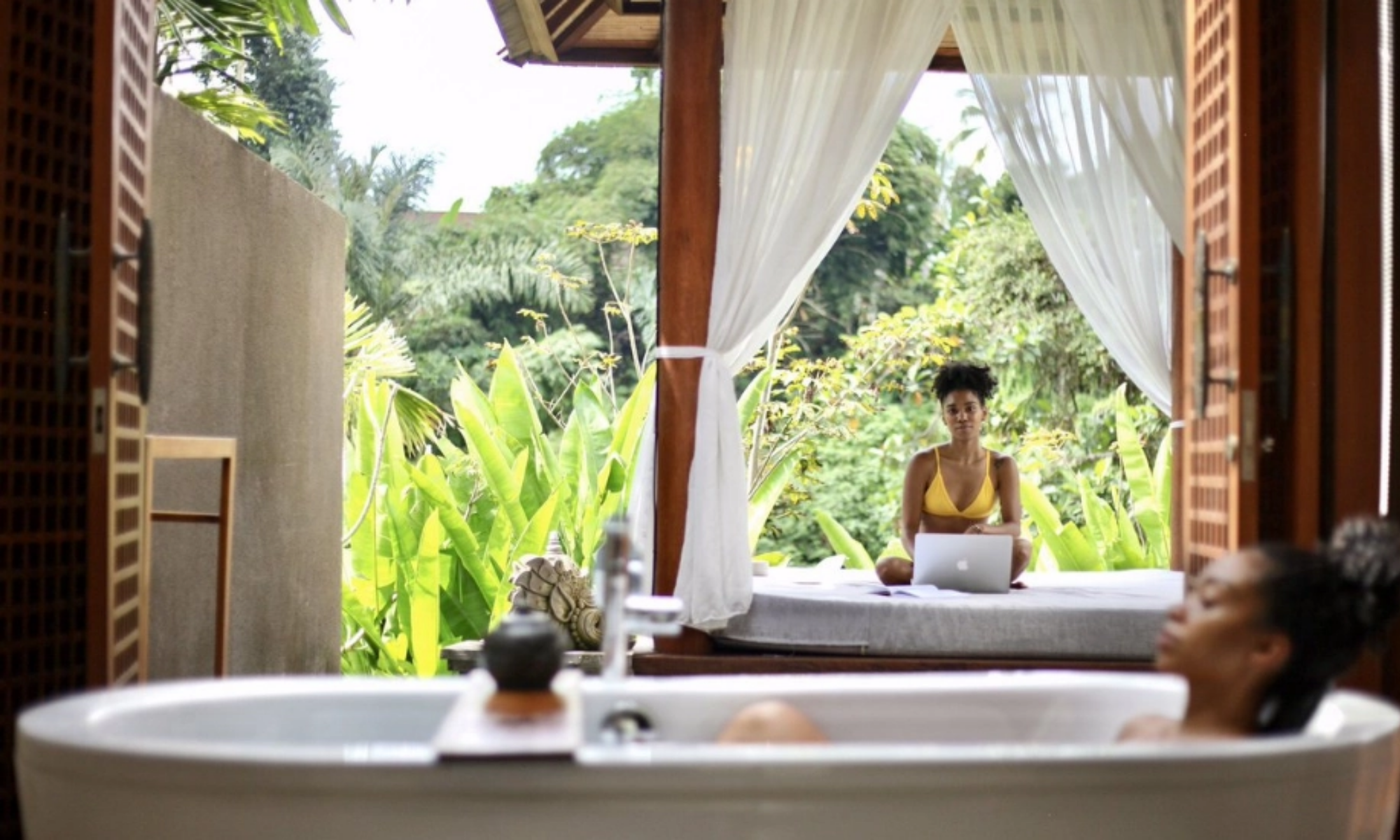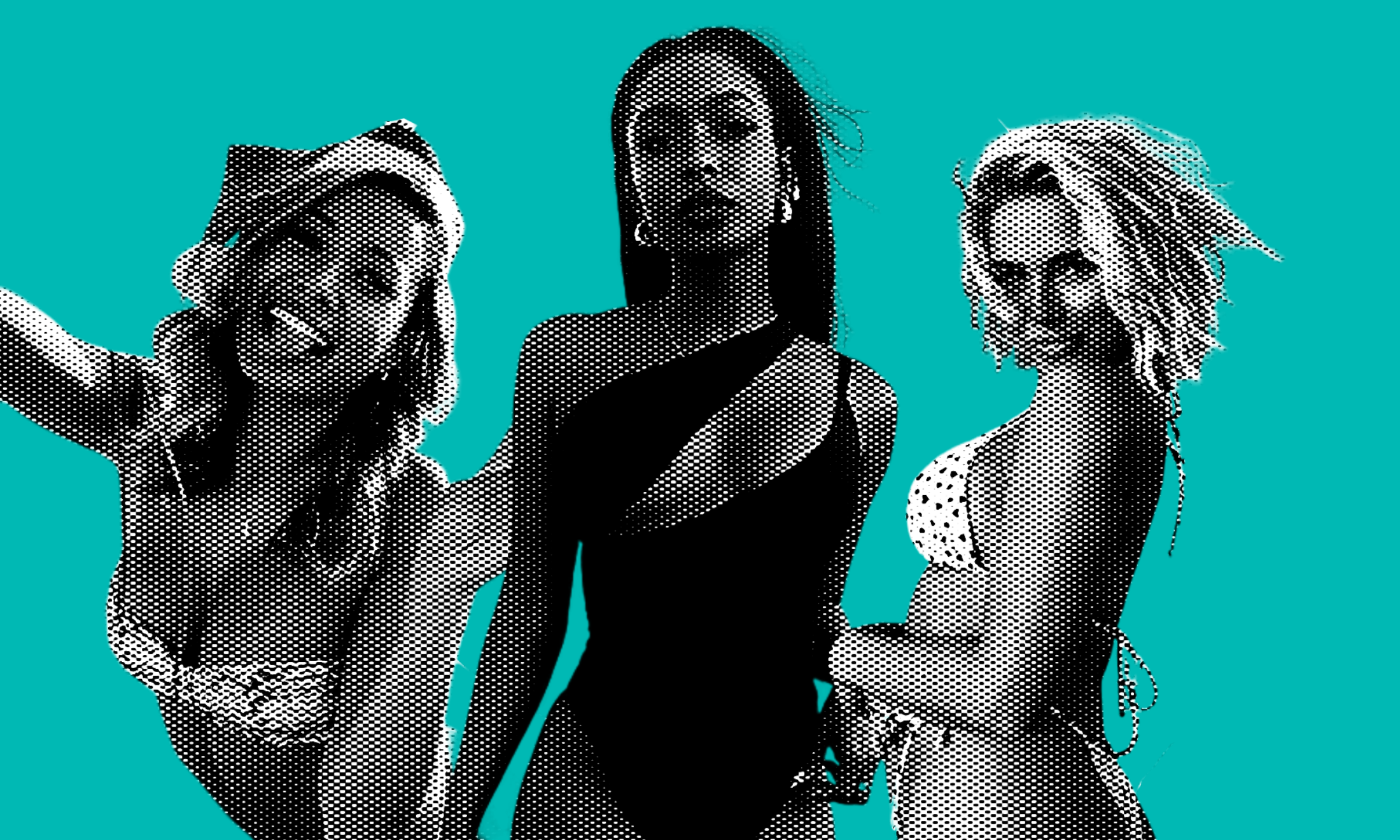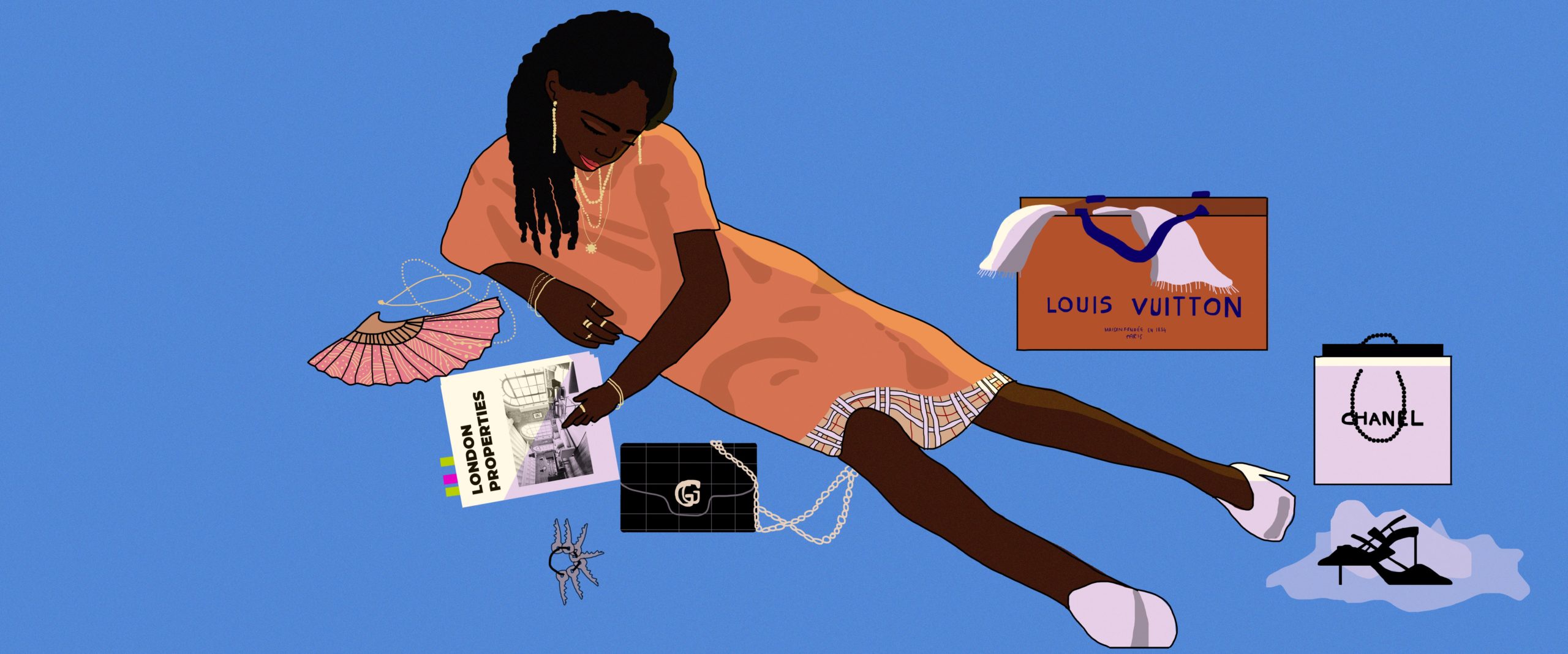Dubai and Black Brits are having a pandemic love affair – here’s why
Sun, sea and suspicious pandemic loopholes.
Lola Christina Alao
14 Jan 2021

Image: via Canva
Scrolling social media, oscillating between lockdowns, recurring images glared back at those of us trapped in our own homes. Was everybody in Dubai? Influencers, as well as musicians, models and other Black folks, gave us minute-by-minute updates of their trips as they lived their best lives. Most of us decided holidays were completely off the table but Stormzy and Dave sunned themselves on a boat, Ivorian Doll perched on the edge of a rooftop pool. Even UK beef was imported to the UAE as a viral video showed rappers Tion Wayne and Headie One getting into a heated fight while on a return flight from Dubai.
Of course, I was envious. Anyone would rather be on a beach cocktail-in-hand than shivering tears-in-eyes in HMP Plague Island. But I was also baffled by how little concern travellers had about catching the virus. Given how dire things had become at home, how had Dubai managed to keep their cases under control? When had everyone else seen the bat signal that had seemingly heralded this destination as a new haven for Black Brits?
Dubai’s appeal likely shot up after the UK was added to its official travel corridor list in November, meaning travellers from the UK no longer had to self-isolate after arriving. However, it was announced a few days ago that the travel corridor that sparked this Dubai renaissance is now closed.
“Anyone would rather be on the beach cocktail-in-hand than shivering tears-in-eyes in HMP Plague Island”
But for people like Priscilla*, who visited the city for a working vacation in December 2020, Dubai’s relaxed travel rules and established infrastructure encouraged her to take the leap and become a nomadic worker. “For me, Dubai is like London but more futuristic,” she says. “It’s very convenient and has better weather, which means there is more to do.”
While businesses at home remained shut for most of the year, Dubai maintained its “city lifestyle” with shopping, restaurants, clubs and entertainment to explore as well as a beach lifestyle complete with relaxing pool lounges, beach clubs, water sports and outdoor dining. “As I was going to be working remotely, having the conveniences of a typical city like great internet and ample workspaces was very important,” Priscilla notes.
As cases have risen 52% in the UAE, there’s fresh critique for travellers, especially influencers, jetting off in the middle of a pandemic. Given the sky-high rates of Covid-19 in the UK and the potential for spread in airports (even if passengers have negative results when they initially enter the space), many have asked if those with online followings were abusing the “essential work trip” travel loophole to live a lavish lifestyle, rather than limit the spread of the virus. Non-essential travel has been firmly advised against the government.
“My guilt came from the fact that I am a travel blogger and I should be encouraging responsible travel especially during a pandemic,” says Charlotte, who spent the whole of November 2019 in Dubai. In her deliberation, she explains that she weighed up the pros and cons before going, and admitted that she “did a spin and made it about ‘escaping’ for [her] mental health”.
“I personally didn’t receive any judgement from friends or family. However, I did see a lot of shade on my Twitter timeline about the amount of Londoners in Dubai,” she says. However, she puts this down to boredom rather than morality. “During a lockdown everything is amplified because we’re spending too much time on our phones.”
An ugly underbelly
There’s suspicion that Dubai has heavily invested in influencer marketing in recent years, in a bid to drive tourism – and sweep the less Insta-friendly face of Dubai under the rug. The experience of Black migrants in Dubai is far less glamorous. Human rights groups have said that the kafala system, which is visa sponsorship, leaves many workers vulnerable to abuse and exploitation. For example, workers are subject to hours and hours of physical labour in the 40 degree heat. It has also been recorded that suicide rates for expats in Dubai are seven times higher than the rate among nationals.
Nekeyla has lived in Dubai for over seven years and teaches at a university. She admits that “migrant workers are not paid very well”.
“Many of my students who are local try to treat the cleaners and food service workers in a kind manner,” she adds. “But your pay and the type of job you can get can be closely tied to your nationality, which can be very unfair”. While Nekeyla hasn’t experienced anti-Black racism in Dubai, she feels her story may have been different if she didn’t have American nationality.
Dubai’s Tourism Board declined to give gal-dem an insight into their influencer marketing strategy, saying it was “not a topic” they gave comment on. But the glittery facade promoted by influencers certainly helps quell discussion of the unsavoury side of the country, which includes well-reported abuse of the thousands of migrant workers who keep the city running, and a ban on homosexuality, with punishments ranging from a 10 years prison sentence, fines, deportation and even the death penalty.
It seems cheaper flight and hotel prices has eclipsed these worries for many. Between April and August, Dubai flights were 4% cheaper this year. As recently as October, six-night, four-star holidays to Dubai were also being sold for less than £500 a person.
Every year, there’s a new travel destination that takes the crown, especially within the UK’s celebrity ecosystem. In an era where everything is posted on social media, the latest hotspot also becomes much easier to track– and flock to.
Since 2017, we’ve seen anointed destinations range from Ibiza, Mykonos, Santorini and Crete. These travel booms are often driven by government investment in tourism, strong social media PR and a new “class of elites” spending money in the many restaurants, nightclubs and contemporary boutiques.
Dubai was also already a destination on the up among influencers, not to mention the fact that trends are likely to spread faster among Black influencers because it is a close-knit demographic. They tend to know each other well and often go on holiday together. Dubai even broke its record for tourism arrivals in 2019, with 16.73 million tourists paying a visit.
Low risk
As the British government completely failed to keep the population safe, Dubai was reported by world media to be at the forefront of tackling the virus. For those who could make it out, they would be able to enjoy life somewhere that was “low-risk”. “Dubai was great, the city had really prepared in advance of opening back up to the world again so it felt very safe in terms of Covid risk,” adds Priscilla.
In May, a huge testing lab was set up in Dubai. The same month, the city broke the record for carrying out the highest number of Covid-19 tests per capita in the world (more than three million tests), while the rest of the world looked on in disbelief. According to healthcare experts, the UAE tests not only those with symptoms but also asymptomatic cases. This helps effectively break “chains of transmission”. Meanwhile, the UK was failing to reach its target of 100,000 tests per day and spent billions on a broken test and trace system that was powered by Excel (as if were the early 2000s).
Dubai’s tourists also have to wear masks wherever they go, even outdoors, unless on a beach or sitting in a restaurant – something social media followers are unlikely to learn from the mask-free pictures posted by influencers. Hand sanitiser is “everywhere” too, says Priscilla, as well as stringent social distancing rules. To enter the country, a negative Covid-19 test is mandatory.
Ife visited Dubai twice last year, the first time pre-lockdown, in February 2020, before returning in December. The second time around, her experience was a mixed bag. She explains that there was a “difference” in the safety regulations compared to the first time.
“I went for my best friend’s 30th birthday, so I felt I had to go,” she says. “I also wanted a break but was very aware that we were still in a pandemic.” Ife lives with her parents and so had to take extra precautions, saying that she followed Dubai’s rules “to a T” and wore a mask everywhere outside of her hotel room. She wasn’t shamed by friends or family for travelling in a pandemic but was warned to be careful.
“With Black popularity comes an anti-Black backlash. On social media, some complained that ‘too many’ Black people were visiting and ‘ruining’ Dubai”
In a year devoid of glamour and Instagrammable moments, the buzz for Black Brits, in particular, seems to have picked up because of Dubai’s luxury status. Tourists reportedly spend more cash over the course of one day in Dubai than holidaymakers do anywhere else in the world. There were other places offering sunshine during the bleak British winter, including Cambodia and Chile – but those who jetted to Dubai liked it for its notorious luxury reputation and the fact that it’s a trending destination.
With Black popularity comes an anti-Black backlash. On social media, some complained that “too many” Black people were visiting and “ruining” Dubai. We saw a similar dialogue earlier in the year about Hermès Birkin bags, sparked by Cardi B wearing one – with social media posts appearing that accused Black people of “devaluing” Birkin bags and other luxury items simply by owning them. The takes were often laced with anti-Blackness and classism, even when posted by Black people.
“If it was white influencers in Dubai in abundance, no one would say Dubai is ruined,” wrote journalist Nasra Ayub in November. “Whenever black people are predominantly doing anything, it’s always ‘being ruined’.” Ife agrees. Seeing the jokes alluding to “too many” Black people visiting Dubai was annoying: “It’s like, why can’t we enjoy things peacefully?” she asks.
For Priscilla, an awareness of Dubai’s anti-Black reputation led to an early decision to “frequent the Black spaces where possible for leisure”, places like Kiza, a restaurant serving Pan-African food. It also means that Black travellers are likely to get the sense of familiarity and comfortability that comes with bumping into people you know from back home.
Despite the obvious dangers around catching Covid-19, Priscilla says that she did not feel any pandemic guilt about travelling to Dubai. “I don’t think people should feel guilty, they should feel grateful they are able to do things that some people can’t at the moment. But that’s always the case, pandemic or not,” she observes.
It makes sense that Black Brits would continue to flock there – it’s one of the only holiday destination options available. Come 2021, it probably won’t be long until there’s a new holiday hotspot for Black Brits to tweet about. However, the memes and tweets were never about Dubai. Moreso it was confusion as to how life in the UK could be so bad, the pandemic could be so catastrophic, and “stay home” became a part of government policy, yet some were gleefully soaking up the rays abroad. Inside the Dubai discourse are complex feelings set against the backdrop of a year denoted by struggle. It is a tale of those who have who stand in stark contrast with the have-nots, and of the willingly obedient versus risk-takers.
*Some names have been changed to protect identities.









